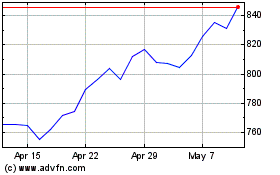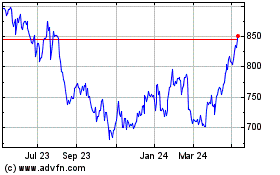By Jack Marshall
As the global advertising industry finishes up a week in the sun
at the Cannes Lions festival in France, executives awoke Friday
morning to news that Britain -- the largest advertising market in
Europe -- will be leaving the European Union.
The financial markets reacted quickly and negatively to the
development, with stock markets falling around the world and the
British pound plunging by more than 11%, on concerns about the
future of politics and economies across Europe.
The initial reaction from media and advertising executives was
one of uncertainty about what it could mean for their businesses
and indeed those of the clients that agencies are paid to
advise.
"Very disappointed, but the electorate has spoken," Martin
Sorrell, chief executive of London-based WPP said in a statement.
Mr. Sorrell had been a vocal proponent of remaining in the EU
leading up to the vote. "The resulting uncertainty, which will be
considerable, will obviously slow decision-making and deter
activity. This is not good news, to say the least."
Friday morning, British Prime Minister David Cameron said he
would step down within a few months, following an epic
miscalculation on his part.
"The PM's resignation clearly adds to the uncertainty," Mr.
Sorrell said. "However, we must deploy that stiff upper lip and
make the best of it."
Publicis Groupe SA Chief Executive Maurice Lévy was forced to
rip up a memo to staff Friday morning that praised the British
people for "making the right decision" in staying in the EU.
Instead, he drafted a second memo on his early morning flight with
a message for the U.K.: "We will stand by you."
Although he was hoping Britain would stay in, Mr. Lévy said that
the EU had botched issues ranging from the economy to what to do
with refugees.
"It's understandable that people are asking themselves what
Europe is for," he said. "It's not just to legislate on the
maturity of cheese and the size of eggs but that's what has
dominated the debate in recent years."
Before the vote, Mr. Lévy said he had done little to prepare for
a "Brexit" vote as he didn't want to give anyone the impression
that it was a genuine possibility. He also felt the two-year window
during which time the U.K. would renegotiate a new treaty to
replace EU membership would be ample time to make any adjustments
to its business.
Interpublic Group CEO Michael Roth sent an email to the
company's employees Friday morning predicting similar market
uncertainty as a result of the news.
"Yesterday's decision will undoubtedly lead to market volatility
in the short term, both in Europe, as well as globally. It's
important to remember that what does not change is the fact that
the U.K. is a vital cog in the world's economy, and that together
with our clients, we'll find footing in a post-Brexit world," Mr.
Roth wrote. "Longer-term, as long as open trade remains a priority,
markets should normalize, and that's the timeline we're focused
on."
Stock prices for European advertising companies mirrored the
activity of the wider market Friday. U.K.-based WPP's share price
fell 4.1% Friday, while France-based Publicis Groupe and Havas
declined about 5% and 2.8%, respectively.
Following the U.K.'s decision, "it's unclear what will happen
with ad spend," Evercore analysts wrote in a research note,
highlighting that the U.K. represents 9% of revenue for Interpublic
and 10% for Omnicom. For WPP, it is about 15%, though Evercore
noted the company's reported revenue from other countries could
benefit from foreign-exchange weakness.
While they evaluate uncertainties about the structure and future
of their own businesses in Europe, agency executives say they are
also fielding questions from clients, who are also unsure of the
impact "Brexit" might have on their marketing activity there, if
any.
"This is completely uncharted territory we're in," said Johnny
Hornby, founder of agency group The & Partnership, speaking
Friday morning at a panel in Cannes hosted by The Wall Street
Journal.
"I've had clients emailing me worried about whether they will
invest in the U.K. if this happened," Mr. Hornby said.
Omnicom CEO John Wren said his company is focused on helping
clients navigate the changes and working closely with its U.K. and
European agencies.
"Over the course of time, we expect these uncertainties to be
resolved and our agencies, clients and consumers will adapt as
markets normalize, " he said in a prepared statement.
Media and advertising firms, like other corporations, have to
assess the impact of potential economic turmoil on their revenue as
well as the effect of currency fluctuations on that revenue.
For instance, Time Inc.'s U.K. arm generated 12% of the overall
company's $3.1 billion in revenue last year. Time Inc.'s shares
recently were down 4.3% in the U.S.
"What tends to happen during periods of market uncertainty and
shocks like this is that everybody assumes the worst, but the
reality is that the fundamentals usually aren't as bad as people
think," said Jaison Blair, a spokesman for Time Inc., which
publishes magazines such as Sports Illustrated and People. "A big
economy like the U.K.'s is far more resilient than people would
give credit."
Michael Bloomberg, founder of Bloomberg LP, also had a message
of resilience, saying the data and information company is committed
to maintaining operations in the U.K.
"We employ nearly 4,000 staff in the U.K., which is home to many
of our major clients. And our new London headquarters will open
next year. We will be in London for the long haul," he wrote in a
memo to clients. "Our priority is to continue to provide
outstanding client service as the U.K. and our clients begin a
transition period."
Many major U.S. media and entertainment companies have made a
concerted push in recent years to expand internationally,
particularly Discovery Communications Inc., which gets about half
of its revenue overseas.
Discovery, whose shares were down more than 6% Friday, said in a
memo that the U.K. has become one its biggest markets and "a
critical creative and business hub."
In reaction to the Brexit news, the company emphasized that its
currency-hedging program would "significantly minimize" the impact
of foreign exchange fluctuations on its financial results.
"We are accustomed to operating in an industry and a world where
change is constant," the company said in a prepared statement. "We
will work closely with U.K. and EU leaders to successfully navigate
this change and find new opportunities to shape our future."
--Nathalie Tadena, Nick Kostov, Jeffrey A. Trachtenberg, Lukas
I. Alpert and Joe Flint contributed to this article.
Write to Jack Marshall at Jack.Marshall@wsj.com
(END) Dow Jones Newswires
June 24, 2016 14:37 ET (18:37 GMT)
Copyright (c) 2016 Dow Jones & Company, Inc.
Wpp (LSE:WPP)
Historical Stock Chart
From Mar 2024 to Apr 2024

Wpp (LSE:WPP)
Historical Stock Chart
From Apr 2023 to Apr 2024
